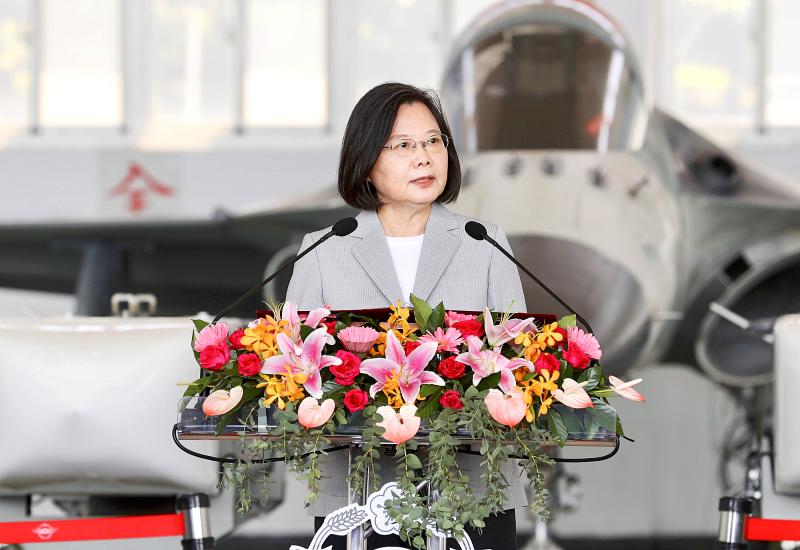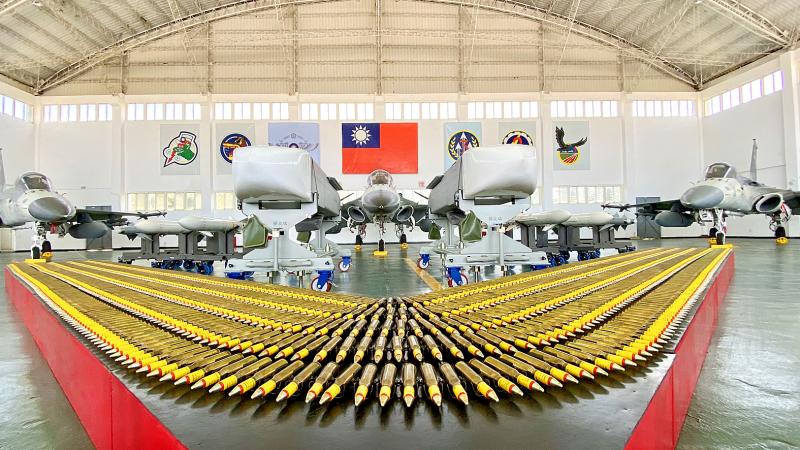Following China’s assertion on Monday that there is no “median line” in the Taiwan Strait, President Tsai Ing-wen (蔡英文) yesterday pledged to defend the nation’s airspace during a visit to an air force base in Penghu, saying that Taiwan cannot allow others to flex their military muscle in its territorial airspace.
Tsai praised the “heroic performance” of the pilots of the Indigenous Defense Fighters who have been intercepting Chinese People’s Liberation Army Air Force planes in recent days.
“I have a lot of confidence in you. As soldiers of the Republic of China [ROC], how could we let enemies strut around in our own airspace?” she said, implicitly rejecting Chinese Ministry of Foreign Affairs spokesman Wang Wenbin’s (汪文斌) comment on Monday that the median line of the Taiwan Strait does not exist, because ‘Taiwan is an inalienable part of China.”

Photo: CNA
“I’m aware that facing the provocative behavior of the communist planes that have encircled the island and damaged regional peace in recent days. Your duty at the front line of the airspace in Penghu must be even heavier,” Tsai told the members of the Tien Chu (天駒, Heavenly Colt) unit, who are stationed at Penghu Airport from April to September every year.
“Our men and women in uniform have the will & ability to defend #Taiwan & are not intimidated by #PRC intrusions in our airspace. We are dedicated to maintaining peace & stability in the region,” she later wrote in English on Twitter.
As of yesterday, a total of 43 Chinese air force planes have flown into Taiwan’s air defense identification zone since Wednesday last week, with some crossing over the median line of the Strait on Friday and Saturday, the Ministry of National Defense’s Web site showed.

Photo: CNA
“The CCP [Chinese Communist Party] claims there’s no median line of the #Taiwan Strait after #PLA [People’s Liberation Army] warplanes crossed it repeatedly. I call on the international community to condemn the CCP for its dangerous & provocative words & deeds threatening peace & the status quo. #China must back off!” Minister of Foreign Affairs Joseph Wu (吳釗燮) wrote on Twitter yesterday.
His comment followed a press release from the Ministry of Foreign Affairs in Taipei on Monday that said Wang’s statement would sabotage the cross-strait “status quo,” just as Beijing had ruined Hong Kong’s “one country, two systems” framework by imposing a National Security Law on the territory.
It called on Beijing to stop its blatant expansionism and urged the international community to condemn Beijing’s behavior.
In rejecting the median line, Beijing shows no regard for regional security, said Su Tzu-yun (蘇紫雲), director of the Division of National Defense Resources and Industries at the Institute for National Defense and Security Research.
The median line, established by the US in the 1950s, created a buffer zone that has been tacitly recognized by Beijing for decades, he said.
The world must be told that China is unilaterally changing the cross-strait “status quo,” Su said.
He said that he considered the possibility of a cross-strait conflict to be low, as China provoking a military conflict would push Taiwan closer to other democratic nations.
Meanwhile, US Representative Ted Yoho on Monday said both Taiwan and the US need to be ready to confront the PLA.
“#Taiwan continues to prepare for the very real possibility of a Chinese PLA invasion by building up its defense posture. The US must be ready to come to the aid of our democratic partner by supporting the #TaiwanInvasionPreventionAct,” Yoho wrote on Twitter, referring to a bill that he introduced in July that would establish a limited authorization for a US president to use military force to protect Taiwan against an armed attack.
Additional reporting by Reuters

The Central Election Commission has amended election and recall regulations to require elected office candidates to provide proof that they have no Chinese citizenship, a Cabinet report said. The commission on Oct. 29 last year revised the Measures for the Permission of Family-based Residence, Long-term Residence and Settlement of People from the Mainland Area in the Taiwan Area (大陸地區人民在台灣地區依親居留長期居留或定居許可辦法), the Executive Yuan said in a report it submitted to the legislature for review. The revision requires Chinese citizens applying for permanent residency to submit notarial documents showing that they have lost their Chinese household record and have renounced — or have never

A magnitude 5.6 earthquake struck off the coast of Yilan County at 12:37pm today, with clear shaking felt across much of northern Taiwan. There were no immediate reports of damage. The epicenter of the quake was 16.9km east-southeast of Yilan County Hall offshore at a depth of 66.8km, Central Weather Administration (CWA) data showed. The maximum intensity registered at a 4 in Yilan County’s Nanao Township (南澳) on Taiwan’s seven-tier scale. Other parts of Yilan, as well as certain areas of Hualien County, Taipei, New Taipei City, Taoyuan, Hsinchu County, Taichung and Miaoli County, recorded intensities of 3. Residents of Yilan County and Taipei received

Taiwan has secured another breakthrough in fruit exports, with jujubes, dragon fruit and lychees approved for shipment to the EU, the Ministry of Agriculture said yesterday. The Animal and Plant Health Inspection Agency on Thursday received formal notification of the approval from the EU, the ministry said, adding that the decision was expected to expand Taiwanese fruit producers’ access to high-end European markets. Taiwan exported 126 tonnes of lychees last year, valued at US$1.48 million, with Japan accounting for 102 tonnes. Other export destinations included New Zealand, Hong Kong, the US and Australia, ministry data showed. Jujube exports totaled 103 tonnes, valued at

BIG SPENDERS: Foreign investors bought the most Taiwan equities since 2005, signaling confidence that an AI boom would continue to benefit chipmakers Taiwan Semiconductor Manufacturing Co’s (TSMC, 台積電) market capitalization swelled to US$2 trillion for the first time following a 4.25 percent rally in its American depositary receipts (ADR) overnight, putting the world’s biggest contract chipmaker sixth on the list of the world’s biggest companies by market capitalization, just behind Amazon.com Inc. The site CompaniesMarketcap.com ranked TSMC ahead of Saudi Aramco and Meta Platforms Inc. The Taiwanese company’s ADRs on Tuesday surged to US$385.75 on the New York Stock Exchange, as strong demand for artificial intelligence (AI) applications led to chip supply constraints and boost revenue growth to record-breaking levels. Each TSMC ADR represents